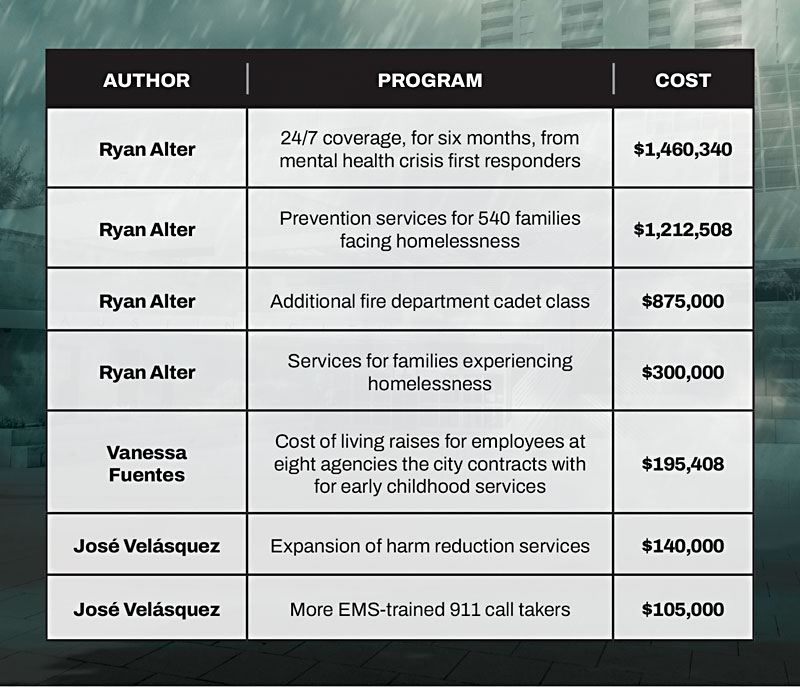
Council members have argued over how much money to put into the rainy day fund, and how much to spend on more immediate needs (image by Getty Images / Zeke Barbaro)
It’s not often that the policy goals of Austin’s more progressive City Council members depend on the vote of Mackenzie Kelly – the body’s only Republican member – but that’s exactly where Council members Ryan Alter, Vanessa Fuentes, Chito Vela, José Velásquez, and Zo Qadri found themselves late into Council’s Aug. 14 budget meeting.
The five CMs came together to propose a slate of seven budget amendments that include increased capacity for emergency response to people undergoing a mental health crisis, adding a new cadet class for the Austin Fire Department, and paying for more services to support families experiencing homelessness.
All together, the package would cost about $4.3 million, but there was no room in the city budget to pay for all of it – unless Council agreed to reject a proposal from the city’s budget staff to increase the city’s emergency reserve fund from 16.7% of the total General Fund to 17%. By forgoing the suggested 0.3% increase to the reserve fund, Council would free up roughly enough money to pay the seven budget amendments. Another option would be to take from any of the projected $43 million increase to the Austin Police Department budget, but that was a nonstarter for Council.
Keeping the emergency reserve static was the only option to afford the amendments. But our Council sources said it appeared that a number of CMs, led by Mayor Kirk Watson, were set on increasing the reserve fund allocation. That bloc advocated for increasing the reserve fund allocation to better prepare the city to deal with various potential emergencies. For most of the meeting, the balance of the dais on the reserve allocation question was tenuously set: Ryan Alter, Fuentes, Vela, Velásquez, and Qadri for leaving the reserve fund as is to invest in more programs and services now; while Watson, Mayor Pro Tem Leslie Pool, and CMs Paige Ellis and Natasha Harper-Madison would have preferred to keep the money tucked away in the rainy day fund.
After a week of lobbying from other Council offices, Kelly – the deciding vote on the reserves question – was expected to support the amendment package. But sources say they were not sure how firm her support was, because Kelly often prioritizes the conservative governing philosophy of fiscal responsibility. Cutting into the city’s reserve funds to pay for more government spending could be a difficult pill for a conservative like Kelly to swallow.
“Trust me, I’m more frustrated than I’m letting on.” – Mayor Kirk Watson
But before the vote showdown could even occur, miscommunication between staff and Council over what they were even voting on threatened to derail the amendment plan. “Trust me, I’m more frustrated than I’m letting on,” Watson intoned to staff from the dais at one point. “This is not the best way to do this.”
Seconds later, Watson recessed the meeting so he and his colleagues could sort the growing mess in private. The mayor has a reputation for running efficient Council meetings where most of the legislative work is done before the meeting already begins; this meeting was perilously close to upsetting that trend.
When they returned, the side of the dais supporting a reserve fund increase took a couple of last stabs at killing the amendment package – but both attempts were parried by CM Ryan Alter. First, Pool tried to amend the amendment package to increase the reserve fund allocation to 17%, which would have rendered the amendments moot because there wouldn’t be any money to pay for them.
But Alter raised a point of order; Pool was offering a “third-degree amendment,” Alter said, which is not allowed under Robert’s Rules of Order – the set of rules governing parliamentary procedure used by City Council (and a whole host of other local governments and professional organizations). Watson said he disagreed, but ultimately allowed Alter’s point of order to stand, neutralizing the first threat.
Then CM Alison Alter attempted to “divide the question,” another parliamentary procedure that would allow CMs to vote on the reserve allocation increase and amendment package separately – which could have given CMs cover to vote on increasing the reserve allocation without having to vote against the amendment package. That motion failed 6-4 (Harper-Madison was off the dais).
Now, about six hours into the meeting, the stage was set for the showdown vote. “I am very concerned about where we’re heading with our fiscal house and keeping it in order … if we continue growing our programs at the pace we are,” Pool said before the vote. Alison Alter and Ellis echoed Pool’s concerns, adding that they worried about disaster scenarios where the $4 million (out of a total fund that exceeds $200 million) might be needed to help Austin residents.
But, in a bit of on-the-dais argumentation rarely seen from José Velásquez, the Eastside CM countered that his constituents were in need of help now. “While it may rain further down the road, it’s raining right now on the have-nots of this city,” Velásquez said, voicing a sentiment that sources agree spoke to the intent behind the amendment package.
The amendment package ultimately passed 7-4 – with Kelly’s vote in favor (in an unexpected twist, Harper-Madison voted, reluctantly, for the package, meaning the hand-wringing over Kelly’s support for the package was unnecessary). “I was caught between a rock and a hard place,” Kelly said of her vote, “but I’m confident the decision I made to lower the city’s reserves to fund these public safety items was the right one.” (Kelly notes that she first tried to reduce spending in various other parts of the budget before agreeing to reduce the reserve fund.)
CM Ryan Alter – who observers agreed deftly handled opposition to the amendment package – was also feeling proud of the vote. “I am so excited that we passed these items because of what they’re going to do for the community,” Alter said. “Almost every single one of them are the types of investments that directly help people and help save us money.”
















